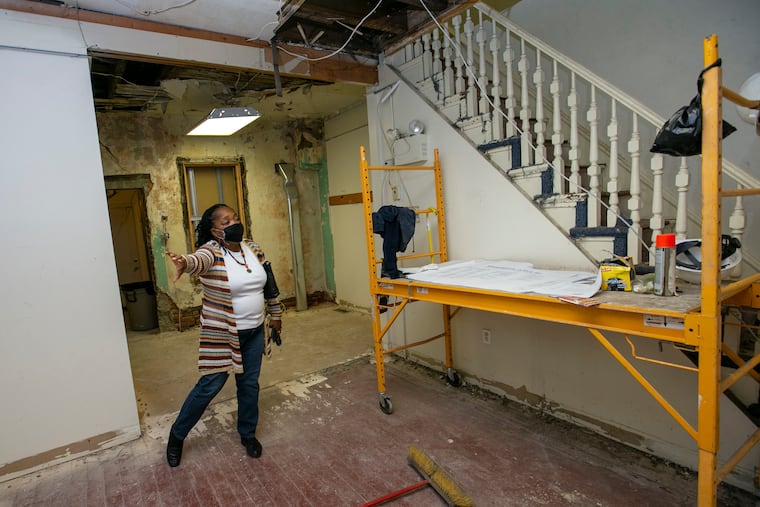A South Philly rowhouse is becoming a free primary-care clinic with a specialty in equity
Miriam Medical Clinics aims to make primary care more accessible to Black patients who are underinsured or uninsured.

Unequal access for people of color has existed in Philadelphia’s health-care system for decades, and the coronavirus pandemic has brought these long-standing disparities — and their life-changing consequences — to the forefront.
A report released by the city last year found that life expectancy among Black men in Philadelphia is just 69.1 years, lower than any other group. The report also found that more than 40% of Black men have hypertension, and nearly one in three has obesity, which puts them at higher risk of developing such chronic conditions as diabetes and high blood pressure, and, now, severe side effects from COVID-19.
What’s more, due in part to past poor treatment, Black residents in low-income urban areas are more likely to go to the emergency room for their medical needs, rather than establishing a regular relationship with a primary-care provider.
That’s why Miriam Medical Clinics, a Philadelphia nonprofit founded in 2012, has been trying to increase primary-care access for the Black community. Studies have shown that primary care, provided consistently, can often prevent visits to the emergency room and improve the health of those with chronic conditions.
The issue is even more urgent now, as cases of COVID-19 are rising again in Philadelphia, said Cornelius Pitts, the clinic’s president and pharmaceutical care director.
“COVID-19 has reawakened us to the presence of the many medical disparities among people of color,” Pitts said. “This sort of push-back from community medical centers is needed now more than ever.”
The clinic’s volunteer staff sees patients at a Spring Garden office that is shared with Bebashi, a full-service HIV/AIDS organization that has served low-income people of color. But Pitts’ vision for Miriam Medical Clinics has always included an independently operated health clinic that focuses on patients of color, particularly those without insurance.
After nearly eight years, the puzzle pieces finally fell into place.
Tasker Street Baptist Church donated a rowhouse at 20th and Tasker Streets, which previously housed the church’s youth ministry. The nonprofit’s supporters raised thousands of dollars, both online and through word of mouth, to cover utilities and insurance. An architect who lives in Point Breeze drew up plans for the space free of charge.
“It’s been a journey,” Pitts said.
After breaking ground earlier this month, Pitts’ team is busy converting the home into an independently operating, free primary-care clinic. The whole endeavor will cost more than $100,000.
To make the clinic accessible for those with disabilities, the front door and windows will be removed to install a wider entrance. Walls will be added to what is currently the living room to create two exam rooms. The bathroom, currently at the back of the house, will be transformed into a dental unit. Michael Johnson, the clinic’s medical director, hopes to recruit a half-dozen health-care professionals to volunteer their time. The team hopes to open in December.
“The church hadn’t used the rowhome for eight years and wanted to give back to the neighborhood in some way,” said Kay Johnson, who will manage the clinic. “Of course, we were very thankful to receive it.”
Pitts said a major goal is to help patients, especially those who have a deep mistrust of health-care systems, feel comfortable receiving medical care.
“That’s a huge task, of course,” Pitts said. “But at the clinic, we will listen to their stories and learn about the trauma and obstacles they face. We want to understand why someone can’t take their medication, or afford it, and then work toward healing with those social determinants of health in mind. That’s what we consider a model of compassionate health care, particularly in a city that’s increasing in the number of people who don’t have access. This will level the playing field, and that’s what we are after.”
Recent research has suggested that Black men, specifically, have better communication with and are more likely to follow recommendations from Black male physicians.
“It’s a well-worn phrase, ‘I want to see someone who looks like me,’” Pitts said. “That’s the main barrier in Philly, along with providers not understanding the plight that African Americans face when it comes to health care.”
If a patient has insurance, the clinic will bill the insurer, but that’s not the priority, Pitts said.
“The first thing we say to patients is, ‘Come in, let’s do an evaluation,’” he said. “It’s not, ‘What insurance do you have?’ People are desperate for good health care. There’s no reason why patients who have hypertension or heart failure should experience intractable pain or die if they don’t have access.”